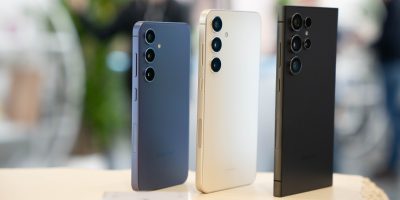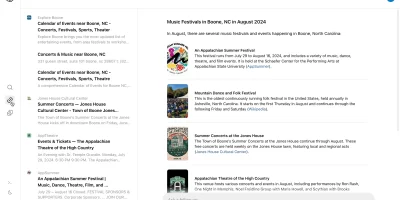 Android Developer Advocate Dan Morrill just made a post on the Android Developer Blog saying that Google I/O 2009 will be the Android Developer Event Of The Year and explains why Android Developers should be especially amped. First and foremost is the technical sessions, 9 of which are already listed on the Google I/O sessions site which I’ve posted below:
Android Developer Advocate Dan Morrill just made a post on the Android Developer Blog saying that Google I/O 2009 will be the Android Developer Event Of The Year and explains why Android Developers should be especially amped. First and foremost is the technical sessions, 9 of which are already listed on the Google I/O sessions site which I’ve posted below:
Turbo-charge your UI: How to Make your Android UI Fast and Efficient (Romain Guy)
Learn practical tips, techniques and tricks for making your Android applications fast and responsive. This session will focus on optimizations recommended by the Android framework team to make the best use of the UI toolkit.Pixel Perfect Code: How to Marry Interaction and Visual Design the Android Way (Chris Nesladek)
A great user experience incorporates three pillars: structure, behavior, and expression. This talk will explore the wide variety of interaction design patterns we have built into the Android system framework to help educate you on the best way to use these pattern-based behaviors for an optimized user experience.Supporting Multiple Devices with One Binary
The Android platform is designed to run on a wide variety of hardware configurations. Learn how to take advantage of the application framework to make your application run on a wide variety of devices without having to build a custom version for each.Android Lightning Talks (YOU!)
Join your fellow developers for a series of lightning talks. If you’ve done a cool hack involving Android, if you’ve devised a clever technique for a common problem, or even if you just want to get up on your soapbox for 6 minutes to appeal to your fellow developers, this is the session for you. We’re opening up this session for a sequence of 8 6-minute slots, where anyone can propose a topic. Attendees will vote on the talks they’d like to hear most, and then it’s off to the races. But be wary of the 6 minute limit, or taste the wrath of The Gong.Debugging Arts of the Ninja Masters (Justin Mattson)
Ever have one of those days where your application just doesn’t run correctly, and you can’t figure out why? Well, we’ve been there, and we’re going to show you how to fix it. In this session, Justin Mattson will school you on the advanced usage of Android debugging tools like traceview, the hierarchy viewer, and the instrumentation system. He’ll also present several case studies where Google used these tools to solve real world problems, and show you the before-and-after results.Coding for Life — Battery Life, That Is (Jeffrey Sharkey)
The three most important considerations for mobile applications are, in order: battery life, battery life, and battery life. After all, if the battery is dead, no one can use your application. In this session, Android engineer Jeffrey Sharkey will reveal the myriad ways — many unexpected — that your application can guzzle power and irritate users. You’ll learn about how networking affects battery life, the right and wrong ways to use Android-specific features such as wake locks, why you can’t assume that it’s okay to trade memory for time, and more.Writing Real-Time Games for Android (Chris Pruett)
Do vertex arrays keep you up at night? Do you have nightmares involving framerates and event loops? If so, this session might have the cure for your condition. Chris Pruett will discuss the game engine that he developed, using it as a case study to explain the common pitfalls and best practices for building graphics-intensive applications. You’ll learn how to properly pipeline game and rendering code, manage drawing surfaces, and incorporate 2D and 3D graphics cleanly.Looking Beyond the Screen: Text-To-Speech and Eyes-Free Interaction on Android (TV Raman, Charles L. Chen)
The Eyes-Free Project (which you might have seen featured by the New York Times) aims to enable fluent eyes-free use of mobile devices running Android. Target uses range from eyes-busy environments like in-car use to users who can’t or don’t want to look at the visual display. Hear from Charles Chen and T.V Raman from the Eyes-Free team about the Text-To-Speech (TTS) API, as well as some of the UI innovations for taking advantage of the touch screen without needing to actually look at the screen. This talk will present a brief high-level overview of the TTS library and the stroke dialer input method, then dive into the details of how you can use these technologies in your own Android applications. Your hosts will then walk you through building a real eyes-free app, and give you a sneak peek at some of the upcoming features in store for the Eyes-Free Project.Mastering the Android Media Framework (David Sparks)
Some monks might take a vow of silence, but Android certainly hasn’t. Attend this session, and help your app find its voice. Android engineer David Sparks will explore the multimedia capabilities of the Android platform, lifting the covers on the infrastructure to show you how it works and the right (and wrong!) ways to use it. You’ll learn how things work under the hood, how to dodge the common media-related developer pitfalls, and how to write secure and battery-efficient media code
There will be even more Android goodness than mentioned above at Google I/O including a fireside chat with the Android Core Technical Team. But what is perhaps the most intriguing is what Dan Morrill let unsaid:
We’re also going to have quite a few folks representing some of our app developer and Open Handset Alliance partners at Google I/O, but I’ll save those details for another post.
and
I’m also excited about a few surprises we’ve lined up… but I can’t say anything about those, or they wouldn’t be surprises, would they?
Seem to hint at some pretty cool announcements occurring at Google I/O so we’ll keep our eye on this for sure. Google I/O is on May 27th and 28th in San Francisco and if you register before May 1st you’ll get in for $300. Otherwise you’ll have to pay $400. Unless you are a Professor, Student or Faculty – then you’ll get in for $50. If you’re not in school tell them you go to Phandroid University and see what they say.










This is probably really stupid.
But do they mean ANY kind of student?? :o
Just a heads up that you usually need a student ID and possibly a current transcript at the registration desk if you want to get the student discount. I don’t think “Phandroid University” will cut it, lol. ;)
What if I give each Phandroid University Student a G1-### Student ID number and photoshop them up student IDs for them to print out?
Haha I was playing around in the first place, but probably good info to know for those considering student admissions!